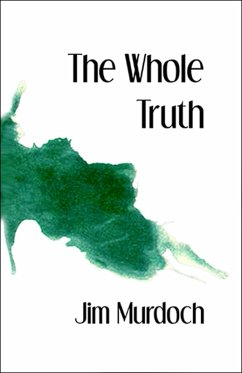Jonathan Payne is a jaded bookseller at the end of a wasted life which has been spent in a dull north England seaside town. He could be an everyman, but seems to have missed the boat somewhere. He's both distastefully pathetic and oddly sympathetic. A passive character, he has been happy to read about life without experiencing either great joy or great despair. If Death were to knock on his door it wouldn't trouble him greatly.
The knock comes, only it's not Death. It's the truth; literally, the human personification of truth.
Truth proves to be a likeable, if infuriating, character with a novel mode of expression: "glib dipped in eloquence and then rolled in a coating of irony," to quote one reviewer. He knows everything and has no qualms revealing intimate details of lives of the people who cross his path while he's with Jonathan. He's quite indiscriminate. The same reviewer described him as "one of the most endearing antagonists I have come across." Comparisons with Peter Cook's devil in Bedazzled are not unreasonable.
Jonathan learns what he's missed out on in life, what other people think and the true nature of the universe which is nothing like he would have expected it to be. At the end, having learned far more than he ever wanted to know, he finds out that it's usually never too late to start again. Only sometimes it is: no Ebenezer Scrooge or George Bailey-esque turnaround for poor Jonathan.
The author Kay Sexton had this to say:
"In all, this is one of those novels that bookshops must hate: not hard enough to be spec fic, not weird enough to be fantasy, too realistic for the humour section and yet too humorous to shelve easily with the lit fic. And that, I suspect is going to prove to be its charm; ...I can recommend that you try itif you like distinctive fiction that rings no bells and blows no whistles but creeps up on you with its absurdities, this book will satisfy you, as it did me."
Living with the Truth was set in the drab reality that is Jonathan Payne's life; its sequel is set in the drab reality that is Jonathan's afterlife. He awakes to find himself inside a landscape entirely generated by his own memories of his past which means it looks pretty much identical to the seaside town in which he spent his entire and mostly uneventful life.
In the first book Truth could only confront Jonathan with people who were alive at the time, but Truth can now raise the bar and put Jonathan through a whole other level of embarrassment and misery including meeting his battleaxe of a mother and being forced to attend a conference made up of versions of himself from all the other alternate realities. All to a good end of course.
It's hard to describe this book without revealing too much. Suffice to say the universe has ended, apparently not for the first time. When Jonathan was alive he got to spend his final two days in the company of Truthnow he gets to meet some of the others, a group known as The Dunameon, with whom God is seriously ticked off because they keep running his creations into the ground.
Jonathan is taken to some dark places but no matter how dark things get Truth is always there to make light of them. Like its predecessor (no pun intended), the book is shot through with wry humour and off-hand allusions to all manner of people from Kafka to Einstein via Frankie Howard.
Very much like Living with the Truth this is a hard book to categorise. As the author Guy Fraser-Sampson said at the end of his review:
"It is difficult to describe Murdoch's prose and do it full justice. You really have to experience it for yourself, and I sincerely hope you will. Go out and buy Stranger than Fiction. You won't be disappointed."
Dieser Download kann aus rechtlichen Gründen nur mit Rechnungsadresse in A, B, BG, CY, CZ, D, DK, EW, E, FIN, F, GR, HR, H, IRL, I, LT, L, LR, M, NL, PL, P, R, S, SLO, SK ausgeliefert werden.


